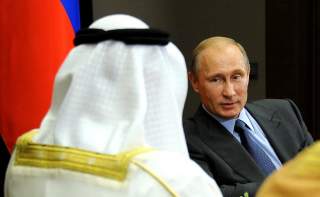How Russia Is Courting the Gulf
They’re on opposite sides in Syria—but that’s not stopping Putin.
Second, Russia has been less willing than Iran to suffer casualties in Syria and views its intervention on Assad’s behalf as finite. Even though the Russia-Syria alliance has strengthened considerably since the mid-2000s, the partnership has historically been inconsistent. Putin also wants to distance himself from the growing perception that Russia is exclusively backing Shia regimes in the Middle East.
These concerns mean that Russia’s alignment with the Syrian government is largely motivated by Putin’s desire to demonstrate to the Russian people that Russia is a great power with influence extending beyond the former Soviet region. Therefore, Putin is likely to ease tensions with Riyadh, if improving ties with Saudi Arabia will expand Russia’s power-projection capacity in the Middle East.
Saudi Arabia’s arms contract negotiations with Moscow and rhetorical praise for Russia’s “great-power” status earlier this year indicate that Saudi diplomats are open to entering a nonaggression pact with Russia should the Arab League’s position on Syria shift away from Riyadh’s views. Therefore, Saudi Arabia is unlikely to engage in overtly hostile actions like funding jihadist organizations that explicitly target Russia, as Jonathan Schanzer and Boris Zilberman argued in October 2015. Instead, Saudi Arabia will focus its efforts on undermining the Russia-Iran partnership through covert diplomacy and rallying anti-Assad sentiments in the Arab League.
In short, Russia is using closer economic ties and diplomatic overtures towards the GCC countries as a stepping-stone for a diplomatic reengagement of Saudi Arabia on Putin’s terms. Even though Saudi Arabia desires Assad’s overthrow, Riyadh’s overarching agenda is to reduce its security dependence on the United States and maintain Saudi Arabia’s position as the Arab world’s most influential country. Therefore, Saudi Arabia is likely to respond favorably to Russian diplomatic overtures, if Putin can build a broad-based Arab coalition around a political solution to the Syrian crisis that includes Assad. Should Putin’s relationships with the GCC bloc continue to strengthen, Moscow’s relationship with Saudi Arabia is more likely to thaw than to descend into prolonged hostility.
Samuel Ramani is a DPhil candidate in International Relations at St. Antony’s College, University of Oxford specializing in Russia-Middle East relations. He is also a journalist who contributes regularly to the Washington Post, Huffington Post, Diplomat and Russian International Affairs Council. He can be followed on Twitter at samramani2 and on Facebook at Samuel Ramani.
Image: Vladimir Putin with Crown Prince of Abu Dhabi Mohammed bin Zayed Al Nahyan. Kremlin.ru

